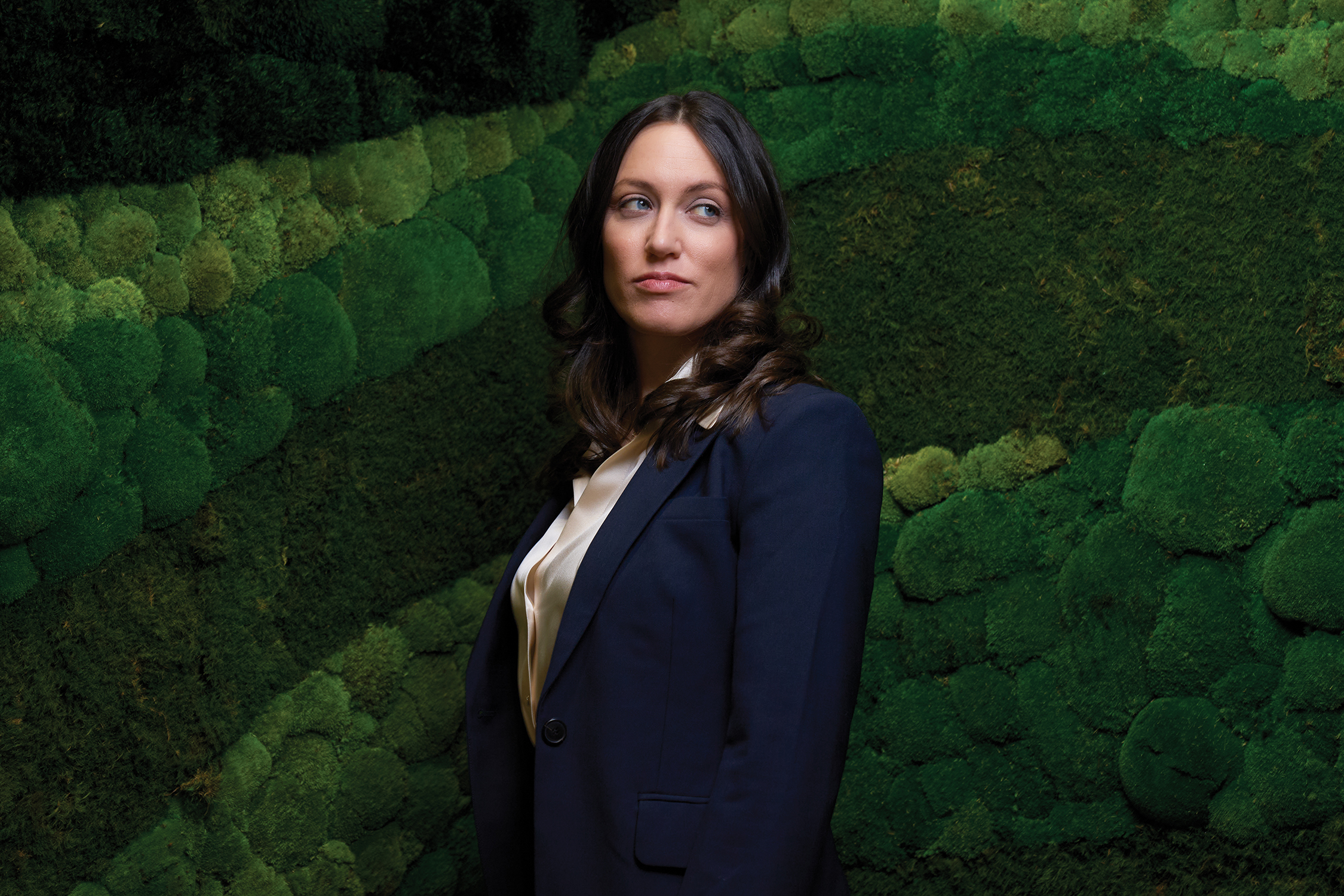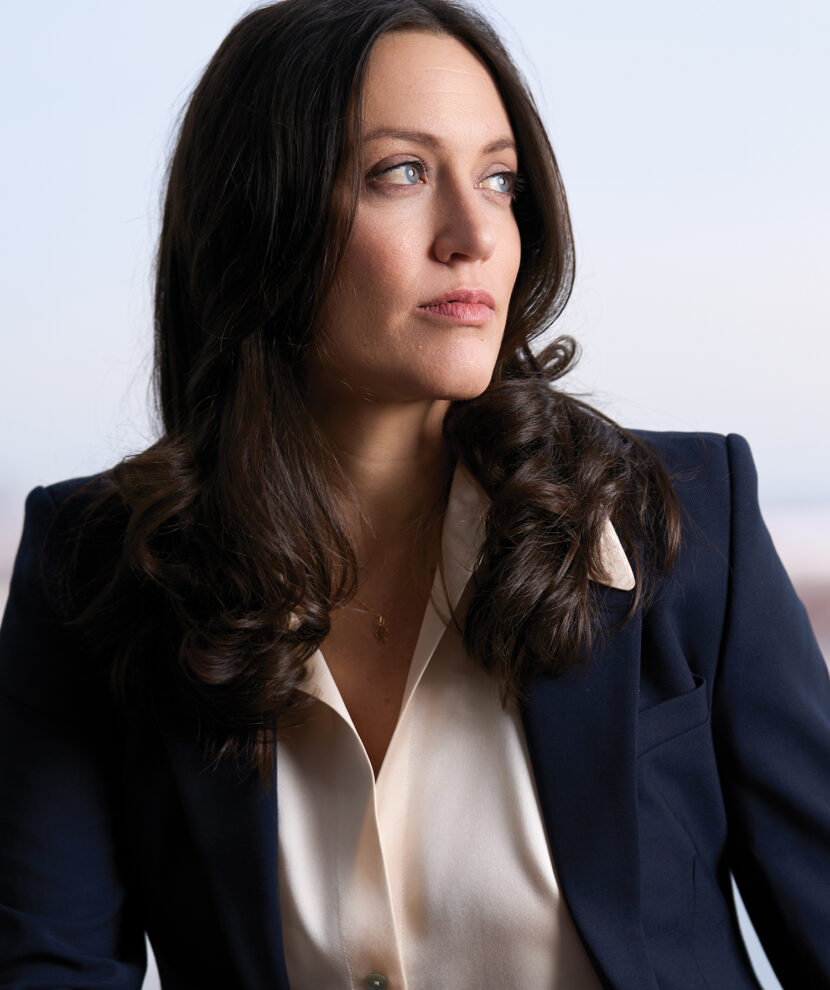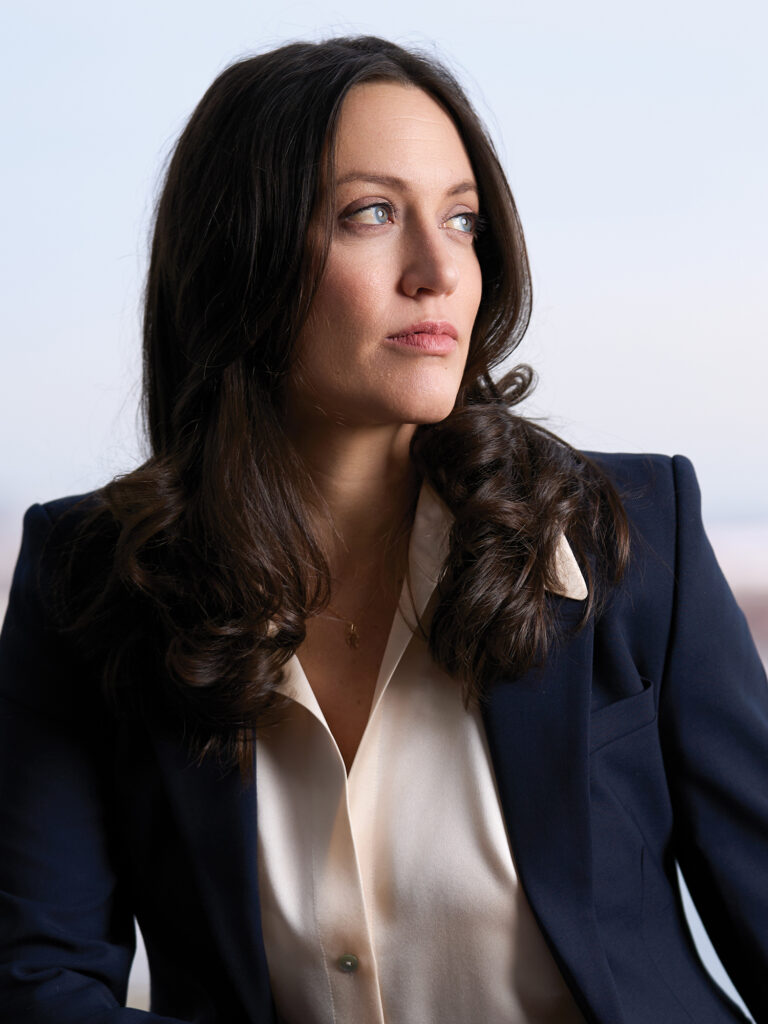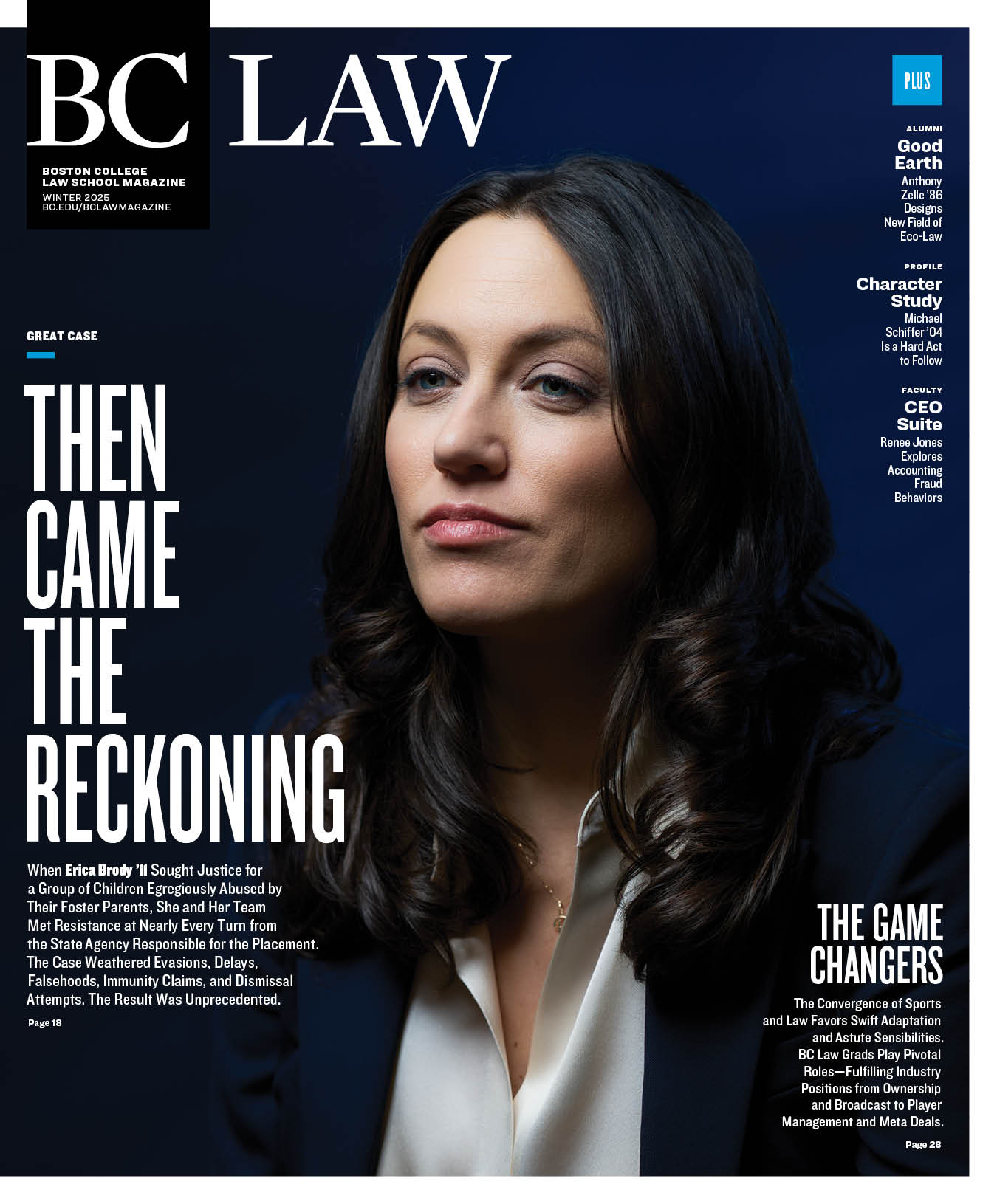They had nothing from their childhoods. No school projects lovingly stored in a box. No photographs. No happy memories. All that existed were the records kept by the Massachusetts Department of Children and Families (DCF) starting from when they were tiny babies and young children and living in a state-licensed foster home that came to be known as the Oxford House of Horrors. They wanted those records—records to which they were legally entitled—to reclaim their childhoods, to understand what had happened to them. For years they tried, but DCF refused.
And then, they got connected to the Boston law firm Brody Hardoon Perkins & Kesten, where Erica L. Brody ’11 is a partner. The atrocities that John Williams, his brother Nathan Williams, Kristine Blouin, and “Mary Doe” alleged that they had endured in the home of their foster parents Raymond and Susan Blouin were so extreme as to be almost unbelievable. And the likelihood of prevailing in any lawsuit against DCF and its employees was, to understate it, low. But Brody’s firm took the case anyway, and put her at the head of a three-attorney team that included the firm’s founding partners Samuel Perkins and Richard Brody, her father. In the end, they won an unprecedented $7 million settlement from the Commonwealth of Massachusetts. They won because their clients persevered, because an investigative journalist cared, because Brody’s law firm placed justice above profit. And they won because Brody was precisely the right lawyer for the job.
In 2018, Kathy Curran, an investigative television news journalist, received an email from John Williams. Williams told Curran that, for years, he had been reaching out to reporters and the state government to tell them about the abuse that he and his younger brother Nathan had endured in the Blouin’s foster home, but no one would listen. Curran and her producer Kevin Rothstein started investigating to see if they could corroborate his story. They spoke with some of Williams’s foster siblings, with caregivers, a teacher, social workers, and John and Nathan’s adoptive parents. They got records from the police and the courts and some from DCF itself. “They were all telling us the same story,” Curran says. “And it was just so awful.”
“When this case came in, my father pulled me into his office and said, ‘If this is true, this is the worst case of child abuse I’ve ever seen.’ And honestly, he was right. I’ve never seen a case like this.”
Erica Brody ’11, lead attorney
From 1987 through 2004, the Blouins—Susan, a neonatal intensive care nurse, and her husband Raymond, a trained emergency medical technician—were licensed by DCF to provide foster care in their home in Oxford, Massachusetts. They fostered some forty children and adopted several of them, including the four who became Brody’s clients. Between 1991 and 2004, fourteen formal reports of suspected child abuse or neglect—known as 51As—were filed against the Blouins. DCF substantiated at least nine of those reports alleging abuse or neglect, but nonetheless left the children in the home. In 1997, a severely disabled child with cerebral palsy died in the Blouins’s care. In 1998, another foster child with cerebral palsy was hospitalized with hypothermia. In 2003, Raymond pled guilty of sexually assaulting two of the children. A year later, when Susan was criminally charged, the state finally shut down the foster home and placed the children with new foster parents. (To avoid having the children testify, the district attorney entered into a pre-trial probation agreement with Susan in which she signed away her adoptive parental rights.)
The nature of the abuse was horrific. There were repeated allegations of the children being confined to dog crates, kicked and punched and whipped with belts, dog leashes, and metal spoons, forced to witness and perform sex acts, bound at the wrists and ankles by duct tape, locked in closets, submerged in ice baths until they passed out, forced to wear diapers even as teenagers. For a time, when Raymond moved out and Susan’s boyfriend Philip Paquette moved in, Paquette allegedly sexually abused the children and forced them to drink their own urine and eat dog feces.
As Curran continued her investigation and spoke with some of the other survivors of the Blouin home, they, too, requested records from DCF. But the agency didn’t respond. Curran then reached out to Leonard Kesten. Kesten is a founding partner of Brody’s firm whom Curran knew professionally, and John Williams wanted to connect with him to see if he could help.

As a rule, state child welfare agencies and their employees are legally immune from tortious liability. In the rare cases that plaintiffs win, the alleged facts have been so egregious as to shock the conscience.
“When this case came in,” Brody says, “my father pulled me into his office and said, ‘If this is true, this is the worst case of child abuse I’ve ever seen.’ And honestly, he was right. I’ve never seen a case like this.”
That’s saying something. Brody began her career as a victims’ advocate in college when she interned for a state district court and for the Massachusetts Office for Victims Assistance. At BC Law, she prepared herself to be a prosecutor, and after graduating, she worked in the Suffolk County District Attorney’s office prosecuting child abuse cases. Brody knows what it takes to be an effective attorney for deeply traumatized victims. “I think you have to earn someone’s trust for them to be able to share their story with you, to feel like they’re supported by you and that you’ll continue to support them throughout the litigation process,” she says. “It requires empathy and patience and a willingness to listen and to meet people where they are.” When she joined her father’s firm, Brody focused much of her civil litigation practice on child abuse and sexual assault, and sexual harassment and discrimination. Brody had seen a lot. But this: “This was the most horrifying case I’ve ever worked on,” she says. For her clients to persevere in this case, she says, “took a whole lot of courage.”
The children had suffered not only from DCF’s indifference to their plight, but also from the denial of records that could have helped them at serious turning points. When, for example, the children were finally removed from the Blouin home, DCF withheld information from the new foster parents. “The foster parents were completely at a loss for why these children were struggling so severely,” Brody says. One of the survivors had been charged with a crime, and DCF’s withholding of records might have adversely affected sentencing.
The egregiousness of what these now-adult children had lived through caused Brody’s firm to take the case.
Brody started requesting her clients’ records from DCF. The response? “DCF stalled, misrepresented, sent inconsistent responses, and over and over and over again basically tried to slow-walk the process and redact dozens of pages in a row of important records, sent inconsistent responses where they would disclose records in one group and then in the new group they would say that those records were protected from disclosure,” says Perkins, Brody’s partner on the case.
“In a situation like that, most lawyers would give up or would just get exhausted and decide that it wasn’t worth the effort or that they just personally couldn’t stand continuing doing that kind of work. But Erica, between forty and fifty rounds of demanding records, kept their feet to the fire, reconciled every single response against all the others to show when they’d been inconsistent and just made sure that DCF was never allowed to get away with misrepresenting what had happened to our clients,” Perkins says. “The thing I really cannot stress enough is Erica’s relentlessness in making sure that a government agency that did everything it could to avoid disclosure and avoid acknowledging what had happened and avoid taking responsibility—she would not let them succeed in those strategies.”
“Ultimately, they produced about 7,000 pages of records,” Brody says, “but there were still records that were missing.” She could tell because DCF released documents that mentioned 51As, and then would deny their existence. As Brody pressed for answers, she discovered that DCF had a practice, until 2008, of shredding records vital to documenting foster children’s lives—including 51A and 51B child abuse reports and investigations.
“As we continued to request records—and they would come in, in dribs and drabs—what we were seeing was this very clear pattern of deliberate indifference on behalf of state actors,” Brody says. Brody and her team sued DCF and more than a dozen DCF social workers and investigators for negligence and endangering children, and for civil and constitutional rights violations. “We filed the lawsuit knowing that most of these suits fail, and that there really wasn’t precedent in Massachusetts for a case like this to be successful,” Brody says. They also sued the Blouins, their daughter Jennifer, and Paquette.
In 2022, DCF moved to dismiss the case. This was the big test. Would the court conclude that the facts alleged in the plaintiffs’ complaint had failed to make a legal case for holding the agency and its employees liable? Or was it going to allow the case to proceed to discovery and permit the plaintiffs, under court supervision, to compel the agency to turn over evidence?
“The case basically moved beyond the technicalities of the statute of limitations or strict rules of civil rights claims and became more of an issue of, did the state really want to go to trial with the kind of record that DCF had amassed about the treatment of these kids.”
Samuel Perkins, member of Erica Brody’s law firm team
In arguing for dismissal, DCF claimed that the agency and its employees were not responsible for the child abuse and endangerment perpetrated not by them, but by the Blouins and Paquette. And anyway, DCF said, the case was “time-barred” because the plaintiffs had failed to sue the agency and its employees for negligence within the statute of limitations.
DCF also argued for immunity. Its actions, DCF said, were shielded by laws that are “intended to protect agencies from liability when they make discretionary decisions that, by their nature, cannot be avoided, can be difficult, and must be made.”
Finally, DCF argued that there was no legal basis to hold the agency liable for any negligent infliction of emotional distress caused by the agency’s withholding of the plaintiffs’ records.
The court was not convinced. The court said that DCF’s argument that the case was time-barred rested on the existence of a document that was not before the court, and so could not form the basis of dismissal.
The court then turned to immunity. Did the plaintiffs’ allegations sufficiently call into question whether DCF’s employees were acting within the legal bounds of their discretion when they did not remove the children from the Blouin home earlier than they did? Did the plaintiffs’ allegation of, as the court wrote, “a complete system failure beginning when the plaintiffs were placed in the home, later adopted, and then ultimately removed” require more information before the court could rule on immunity? Yes, to both, the court concluded: to assemble a record for an informed judicial decision on DCF’s defenses, the case could proceed to discovery.
And with that, on September 22, 2022, the court denied DCF’s motion to dismiss. The news reached Brody as she was driving her car. Her father called, yelling “We won! We won!” Brody pulled off the road to get a handle on what he was saying. As soon as she understood, she called each of her clients. “They were overjoyed. They knew what a longshot it was,” Brody says. “It gave them hope.”
Now it was a whole new ballgame. “The case basically moved beyond the technicalities of the statute of limitations or strict rules of civil rights claims and became more of an issue of, did the state really want to go to trial with the kind of record that DCF had amassed about the treatment of these kids,” Perkins explains.
DCF appealed the ruling. Meanwhile, Brody and her team kept the heat on. In March of 2023, they sought permission from the court to amend their complaint for the third time. The third amended complaint alleged in painstaking detail how DCF had unlawfully destroyed reports of child abuse and child-abuse investigations pertaining to the plaintiffs, and the conscience-shocking facts that, as gleaned from other records that DCF had disclosed, the destroyed records would have substantiated.
In 2024, as the leadership of the Massachusetts state government changed hands and Attorney General Andrea Campbell was sworn into office and her predecessor, Maura Healey, was sworn in as governor, the state started mediation with the plaintiffs. On August 11, 2024, “We won! We won!” rang out again. This time, it was Brody calling her father to tell him that their four plaintiffs had reached a historic $7 million settlement with the state. Sadly, one plaintiff, Kristine Blouin, did not live long enough to see it; she died of an overdose in 2022.
“By successfully avoiding dismissal based on qualified immunity, Attorney Brody used the legal system and media to expose allegations of grievous wrongs done to vulnerable children.”
Jenny Chou ’91, executive director, The Children’s Law Center of Massachusetts
“To Attorney General Campbell’s credit, she sat down with our clients and listened to what happened to them. And to Governor Healey’s credit, she approved the settlement. I think there was a shift in, from the defense perspective, what was the right thing to do,” Brody says.
A spokesperson for Attorney General Campbell told BC Law Magazine, “In the face of horrific and appalling abuse at the hands of the Blouins, the plaintiffs have exercised immense bravery and resilience in sharing their stories. We hope they will find some measure of closure through this settlement.”
“By successfully avoiding dismissal based on qualified immunity, Attorney Brody used the legal system and media to expose allegations of grievous wrongs done to vulnerable children,” says Jenny Chou ’91, executive director of The Children’s Law Center of Massachusetts, a child advocacy organization. “The hope is that this suit may embolden others who have been abused in foster care to come forward and for more attorneys to give voice to them through such actions.”
The lawsuit also led to broader reforms. Internally, DCF kept an “alleged perpetrators list”—a roster of caregivers who were prohibited from fostering or adopting a child or working for DCF because they had committed abuse. As a result of Brody’s lawsuit, DCF now shares this list with the Massachusetts probation department and the Department of Elementary and Secondary Education. In addition, through an interstate agreement, Massachusetts now shares the list with New Hampshire.
New criminal charges were also filed. As of November 2024, according to a spokesperson for the Worcester County District Attorney’s Office, Philip Paquette is facing two counts of child rape and one count of witness intimidation. A new case against Raymond Blouin was dismissed at the request of the victim, who did not want to testify at trial. At a bench trial, Susan Blouin was found not guilty of one charge of indecent assault and battery on a child under fourteen.
The Blouins are not off the hook, however. The settlement resolved the case against the state and its employees, but Brody’s firm is still pursuing personal injury claims and Massachusetts civil rights claims against them. “Our clients will never be made whole. How do you compensate someone for the loss of their childhood? Even so, our justice system offers an opportunity for our clients to confront their abusers and to tell a jury what happened to them when they were only children. It offers a type of accountability and validation they have never been afforded,” Brody says. “We hope that this case has helped make the Massachusetts foster system safer, and has shown other survivors that if they come forward, they will be believed, and their voices will be heard.”




